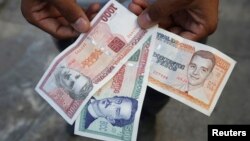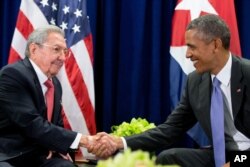Cuba is near a deal with 15 rich creditor nations of the Paris Club to restructure $16 billion in debt stemming from a 1986 default, with creditors expected to forgive most of the amount owed, diplomats close to the talks said.
The parties will meet in Paris later this week and, after two years of informal discussions, are close to a multilateral deal, the diplomats said.
"Cuba has agreed to pay the principal of around $5 billion owed since its 1986 default in exchange for forgiving $11 billion in service charges, interest and penalties," said one diplomat from a major creditor nation. "Negotiations are now more about how much time they need to pay it and how much of the money will be reinvested in Cuba."
Cuba has secured investment agreements from creditors in previous debt negotiations and is seeking similar commitments from the Paris Club nations, the diplomats said.
The Paris Club is an informal group of creditor governments from Australia, Austria, Belgium, Britain, Canada, Denmark, Finland, France, Germany, Ireland, Italy, Japan, the Netherlands, Norway, Russia, Spain, Sweden, Switzerland and the United States.
It has a 15-member working group on Cuba that excludes those countries - the United States among them - that do not hold the debt under negotiation.
Most of the creditors are willing to show flexibility due to their increased interest in doing business in Cuba following the Communist-run island's detente with the United States and continuing domestic reforms.
U.S. President Barack Obama and Cuban President Raul Castro announced a year ago their governments would work toward a normalization of relations after decades of confrontation, although a U.S. trade embargo of Cuba remains in place.
Castro, who replaced his ailing brother Fidel as president in 2008, has made restoring Cuba's international financial credibility a priority. He has reined in imports and cut state payrolls and subsidies while insisting the near-bankrupt government get its financial house in order.
Cuba has had a trade and current account surplus since 2011 and has improved its payments record to creditors and suppliers.
In the past four years, Cuba has restructured its debt with Japanese commercial creditors, Mexico and Russia, each time obtaining reductions of 70 percent to 90 percent in what was owed and extended payment plans it could meet in exchange for greater investment opportunities on the island.
Cuba also has restructured its debt with China, estimated by local economists at more than $6 billion.
"Our companies want this out of the way so they can obtain financing for investments," one European diplomat said. "They want to get here before the Americans lift the embargo."
Cuba is not a member of the World Bank nor any other multilateral lending institution.
"A comprehensive deal would go a long way toward normalizing Cuba's international financial relations and gaining access to official trade credits," said Richard Feinberg, a non-resident senior fellow of the Washington-based Brookings Institution and the author of several studies on Cuba's need to join the international financial community.
"However, a deal with the Paris Club will not get Cuba a good international credit rating. That can only come from more robust export earnings and a healthier sustainable balance of payments," Feinberg said.
Cuba does not comment on debt negotiations.
The government last reported its "active" foreign debt, accumulated after it defaulted in 1986, at $12.5 billion in 2012. It no longer reports its "passive" debt from before the default, the principal of which local economists estimate at $8 billion.
The Economist Intelligence Unit estimated Cuba's total foreign debt as $26 billion at the end of last year.
This week's formal negotiations with the Paris Club creditors are the first since negotiations failed in 2001.






